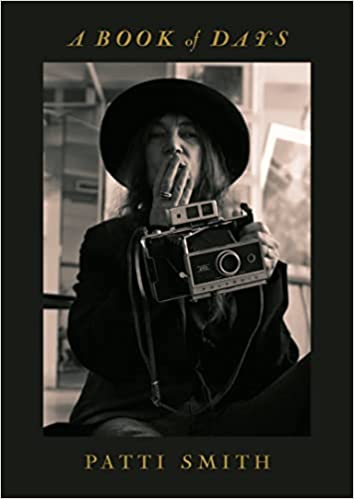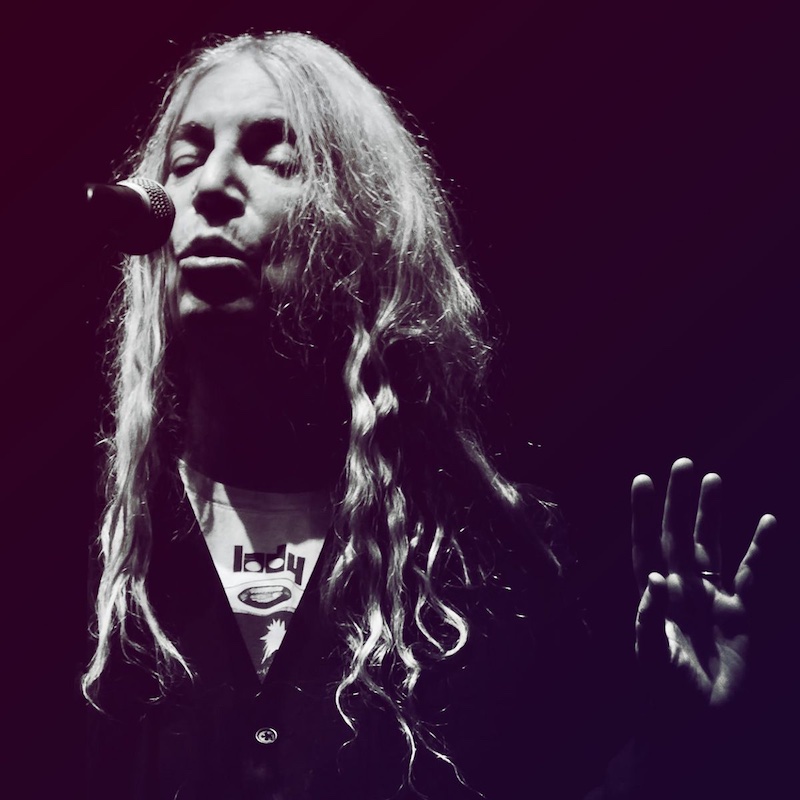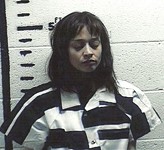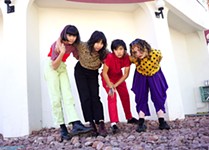Patti Smith: “I don’t claim to be a progenitor of any particular movement – I just did my work”
Ever-evolving singer, writer, & artist communes at ACL Live Saturday
By Tim Stegall, 12:25PM, Mon. May 2, 2022
April 17, 1976: Saturday Night Live, NBC’s controversial new late night sketch comedy show which premiered six months earlier, was beaming into America’s living rooms and bedrooms, including those of a few children whose parents might have been upset at what was being exposed to tender minds.
This evening, President Gerald Ford’s press secretary Ron Nessen was the guest host – hilariously subversive, for such a revolutionary program, born of the counterculture. Maybe 40 minutes into the broadcast, Nessen stares into the cameras at 30 Rockefeller Center and intones, “A special, uh, treat for me tonight – and I think for you, too – is the Patti Smith Group….”
After the camera focuses on pianist Richard DNV Sohl’s hands hammering out a trio of chords, it dissolves to Patti Smith in close-up, her profile emerging from inky black. The first words out of her mouth, before jutting her jaw in determination? “Jesus died for somebody’s sins, but not mine.”
In 24 seconds’ time, Chicago-born, New Jersey-raised Patricia Lee Smith, then 29-years-old, blew apart several social and musical taboos, in the first eight words of her sacreligious remake of Van Morrison’s garage rock standard “Gloria.” She also blew every set of ears which had not heard those words on the Patti Smith Group’s landmark debut LP Horses, released the previous November 10th. It was the world’s first notice that a musical/cultural revolution was brewing in a long, narrow room on NYC’s Bowery called CBGB.
While Smith and her musical cohorts – guitarist Lenny Kaye (also a pioneering rock journalist who defined the garage aesthetic with his seminal Nuggets compilation in 1972), drummer Jay Dee Daugherty, Sohl, and guitarist/bassist Ivan Kral – hardly invented punk rock, they lent the form beauty and poetry. She straddled the sanctified and the secular, bridged Sixties counterculture with Seventies rebellion, and served as punk’s original poet laureate. Her imprimatur and blessings anointed punk scenes the world over, including a June 1978 evening at Raul’s at which she joined the Skunks onstage in an improvisation, centered around the instant refrain, “Tell God the Skunks are here/Have no fear now, now, now….” Earlier that day, her brother Todd bought her the antique dress she wore on the cover of her 1979 LP, Easter.
Save for the 15 years she retreated from the spotlight to raise a family with her late husband Fred “Sonic” Smith (of the MC5), Patti has remained active to the present, including recording and touring with her band, still featuring Kaye and Daugherty alongside bassist/keyboardist Tony Shanahan and son Jackson Smith on guitar. But she’s increasingly concentrated on her writing, which forms the basis of all she does – her best-selling memoir Just Kids, about her early days in NYC and formative relationship with artist Robert Mapplethorpe, won the National Book Award for Non-Fiction. She has received numerous honors, ranging from honorary doctorates to arts and humanities prizes, including the French Ministry of Culture “Commandeur des Arts et des Lettres.” The 2007 Rock and Roll Hall Of Fame inductee performs Saturday, May 7th at ACL Live at the Moody Theater. She spent 30 minutes on the phone with us a week ago, to discuss Austin, the cultural changes she inadvertently wrought, her admiration for young climate change activists, and her Instagram page, among other topics.
Austin Chronicle: You are coming to town for the first time since April 30, 2013 (at Stubb’s).
Patti Smith: Wow! Has it really been that long? Doesn’t seem that long ago. I think actually I’ve done some book events in Austin, because I know I have been in Austin since then. It’s gonna be great coming back. I always loved coming to Austin. It’ll be exciting.
AC: You haven’t released an album of new material since Banga in 2012. But it seems you don’t need to have a new album to promote in order to tour, at least for the last several years.
PS: Oh, I don’t tour to promote, no. If I have an album and we're working in conjunction with it, that’s great. But I’ve always felt that touring and performing is its own specific thing. You’re greeting people and doing concerts. I don’t really expect to sell anything through concerts. I just expect us to hopefully make a transformative night. I haven’t done an album in some years. It’s just about visiting some cities that I really like and having some contact with the people directly.
AC: That desire to communicate at the higher levels at which you operate – you are an interesting mix of the sacred and the profane, if you will.
PS: [laughs] I think about this movie – did you ever see the movie Amadeus, about Mozart? In it, he says to the king – because Mozart was like a punk rocker, really – “Your majesty, I may be crude, but I assure you my work is not.” So, I suppose I’m sort of a down-to-earth person, but I also have high aspirations. I’m well-read, and I’m interested in the arts and the different ways people worship and what’s happening in our world. But I also am as I am. [chuckles] So…
AC: Well, I think the ultimate summary of your art in so many ways can be boiled down to what is probably your most famous line: “Jesus died for somebody’s sins but not mine.” Growing up in a small Texas town and being comfortable with Southern religions, when I heard that at age 12, it blew my mind: “Whoa! You can say that in a rock ‘n’ roll song?!”
PS: It’s a good place to say it. I was raised on the scriptures. I read the Bible and studied it all my life. But that statement was not a statement against Jesus, who was a great teacher and a revolutionary. But it was really opposing how the church used him, or made him this hallmark of behavior. Everything we did, every mistake we made reflected on our relationship with Jesus, and it was less about Jesus and more of a declaration of existence as a young person. I wrote that in a poem when I was 20, long before I recorded it and it was my Declaration of Independence. I wanted to make my own mistakes. I wanted to make my own choices. And that’s where that statement came from. Sometimes, people since then are confused by my interest in religious art, or different religions, or Christianity or the Bible. And I just tell them, “I’m an evolving person, always studying and rethinking things.” But at that time, I was a very young person who wanted to declare my independence – independence from religion.
AC: And this is why you are every punk rocker’s godmother. This entire scene evolved out of things you helped set in motion. And yet you’ve never denied your relationship to the Sixties. You’ve never rejected the ideas that you perhaps learned from the hippie period in American counterculture.
PS: Well, I was young then. What I have never denied is my love of history, my love of art. I’m not nihilistic. I love the 19th century poets. I love the Beat poets. I love a lot of the Bible. I love Jimi Hendrix. The basic ideology of the Sixties, no matter what happened, the cornerstone was love, which is also the cornerstone of Christianity – “love thy neighbor.” I think the ideology of all of our artists – Coltrane, Jimi Hendrix – everyone wanted the same thing. We wanted world peace, we wanted to be free. I found there was a lot to embrace in that period. But in the Seventies, I was also interested in the new, in breaking barriers, in creating space for new people. But I don’t think it was myself or my band. We were there at the time, and hopefully we could just create space. But then it was all the new people, the new bands that came that really made strong statements. And that’s the idea – we all do our work to make space and help make room for the next generation of workers. In other words, I don’t claim to be a progenitor of any particular movement. I just did my work.
AC: Right. Well, it’s up to guys like me to make those proclamations!
PS: Thank you!
AC: You are also a godmother to modern day feminism. Before Billie Eilish was concealing herself in her clothing, you did everything possible to downplay your own sexuality, yet it was also fairly upfront as well. You dressed in a fairly androgynous fashion.
PS: Well, I didn’t do anything consciously. I just did what I wanted. That statement, as you said, at the beginning of “Gloria” had to do with everything. It had to do with how I carried myself. I dressed the way that I wanted. I presented myself the way that I wanted. But I had no real agenda. I don’t like labels. I didn’t want to be called any particular thing.
What I was more interested in was creating an atmosphere and creating work for people of like mind, or people who felt like they had no recourse or were too maverick or too weird, or they were disowned because they were gay or whatever. This was for people of any persuasion who felt they had nothing to identify with. But I wasn't really consciously trying to be androgynous. I just wore the clothes I felt comfortable with/that I felt good in/that I liked myself in. One day, it could be a silk dress and combat boots. Another day, it could be a Catholic schoolboy’s little black suit. All I’m saying is I didn’t have any particular thing I was trying to prove or push. I just did what I wanted.
People ask me if I was more marginalized because I was female, and I think perhaps that was so, but for me, I think it was also because of my work. My work got me in as much trouble. It got me banned on radio, for things that seem kinda funny now. I got in more trouble over “Pissing In the River,” and it had nothing to do with whether I was male or female. It was just that sometimes my work offended people. “Jesus died for somebody’s sins” offended a lot of people, but I still wear the clothes that I want, and I do my work as best I can. But I think there’s a lot more opportunities for people now. We still have a ways to go, but there are a lot more opportunities for women in the music business, in the arts, and for people of color in the arts too. But we have a lot more work to do. We have to get to a point where one doesn’t even think about things like that, where people are just artists, they’re just musicians, whatever their vocation is, and everyone is given an equal opportunity. But I think that each generation makes its strides.
AC: I know you’ve been very supportive of figures like Greta Thunberg and others.
PS: Yes. My daughter [Jesse Paris Smith] is a climate change activist. She has a non-profit called Pathway To Paris. I’ve learned a lot about fossil fuels and things from my daughter. Certain things I know intuitively, but she’s a real activist. And Greta Thunberg! Such a young girl who has given up a lot of her childhood to fight for our planet, to fight against climate change. Yes, I admire our activists. I couldn’t call myself an activist, even though I do what I can. But basically being an artist and being a writer, being a performer? The lion’s share of my energies goes to doing my work, but the lion’s share of Greta Thunberg’s energy goes into saving everything – saving our rainforests. She’s working with her whole being with such urgency. I could never match her, but she is inspiring. I’m grateful that our new generations are taking up this, probably the most important cause on the planet – climate change.

AC: I think at this point, it would be important to think of Patti Smith as a multimedia artist rather than any one particular thing. But the basis of everything you have done is your writing.
PS: [emphatically] Yes!
AC: The writing has become especially important over maybe the last 20 years, with a number of books published. And across COVID, you developed quite an interesting Instagram account, which is about to become the basis of your next book, I understand.
PS: Thank you. It’s a book called Book Of Days, and it’s sort of made like a diary. It has 366 dates, allowing for leap year, with a picture for each date and a caption or a message. But they’re not pulled off my Instagram. There’s some I might have used for my Instagram, but the format is inspired by my Instagram. I wanted it to be new, with new images and new thoughts. It’s a little thought for the day book, with a little image and a thought for each day. I like my Instagram. It gives me a chance to share within it poets and musicians and mathematicians and scientists and books that I’ve discovered that I really love, and people and history. And also just thoughts sometimes, just humorous ones or thoughts about what’s happening in our world in that same very accessible Instagram language, or at least on my Instagram, which I guess is somewhat tinged with poetry. But I’ve worked really hard. It was actually technical. It was very, very difficult to put together 366 images and try to have something thoughtful for each one. I’ve just finished it, so it’s fresh in my mind. That’ll probably come out in mid-November. I just thought it would be a nice way for people to access a lot of different ideas about things in a way that’s pleasing, semi-seductive [laughs].
AC: One can pick up on themes on your Instagram that resonate through all your work. You are fond of talismans and people’s birthdays and things like that.
PS Yes! I’ve always been, and this little book reflects that. I’ve visited a lot of the graves of poets and artists that I love, and I have some of my talismans have some value and some might be of value only to me. But we all have that. So I think in referencing them, people think of their own. That’s always the thought: You give people work, so that hopefully it can turn back on themselves and make them think of how it’s meaningful for them. It’s like when one performs. I don’t perform for myself, I perform so that we have a night that’s somewhat transformative. And I hope that people leave being more inspired or thinking of what they can do in the world, how they can make things better, how they can make life all around them better. Part of the reason to do work is to inspire people, incite them.
A note to readers: Bold and uncensored, The Austin Chronicle has been Austin’s independent news source for over 40 years, expressing the community’s political and environmental concerns and supporting its active cultural scene. Now more than ever, we need your support to continue supplying Austin with independent, free press. If real news is important to you, please consider making a donation of $5, $10 or whatever you can afford, to help keep our journalism on stands.
Jordan Smith, Sept. 20, 2012
Jan. 13, 2023
Dec. 30, 2022
ACL Live, Book of Days, Greta Thunberg








